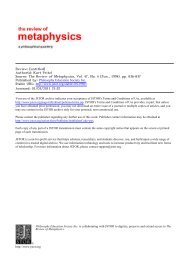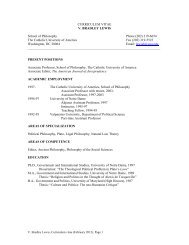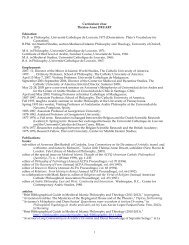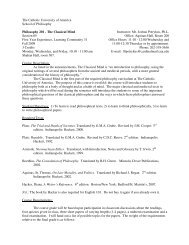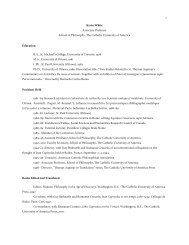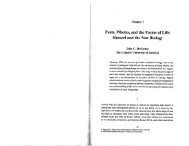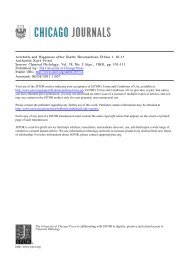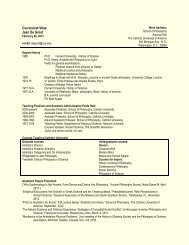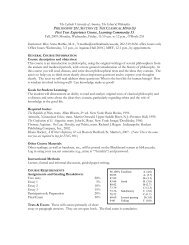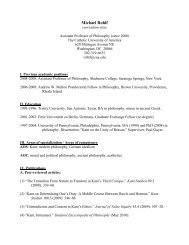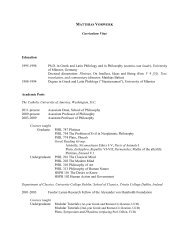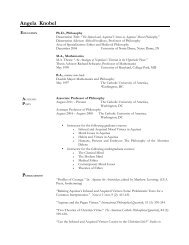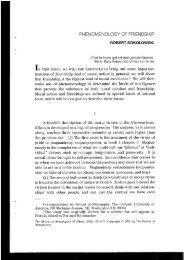syllabus phil 201-11[Fall 2009] - School of Philosophy - the Catholic ...
syllabus phil 201-11[Fall 2009] - School of Philosophy - the Catholic ...
syllabus phil 201-11[Fall 2009] - School of Philosophy - the Catholic ...
You also want an ePaper? Increase the reach of your titles
YUMPU automatically turns print PDFs into web optimized ePapers that Google loves.
The <strong>Catholic</strong> University <strong>of</strong> America<br />
<strong>School</strong> <strong>of</strong> <strong>Philosophy</strong><br />
First-Year Experience<br />
The Classical Mind<br />
<strong>Fall</strong> <strong>2009</strong><br />
Course: PHIL <strong>201</strong>, section <strong>11</strong> [LC 101, section 14] (3 credit hours)<br />
Meetings: Mondays, Wednesdays, & Fridays <strong>11</strong>:10 - 12:00 pm<br />
Location: Maloney 018<br />
Instructor: Mr. Nicholas Kruckenberg, M.A.<br />
Office: 314 McMahon Hall<br />
Office Hours: MWF 10 - <strong>11</strong> and by appointment<br />
Phone: (202) 319-6948 (during <strong>of</strong>fice hours only)<br />
Email: 41kruckenber@cardinalmail.cua.edu<br />
Course Description<br />
This course is an introduction to <strong>phil</strong>osophy, using <strong>the</strong> original writing <strong>of</strong> several <strong>phil</strong>osophers from <strong>the</strong><br />
ancient and medieval periods, with a more general consideration <strong>of</strong> <strong>the</strong> history <strong>of</strong> <strong>phil</strong>osophy.<br />
First, a word about what <strong>phil</strong>osophy is and why it is important. <strong>Philosophy</strong> is, in general, a love <strong>of</strong> and<br />
search for wisdom (roughly, complete knowledge about ourselves and <strong>the</strong> world). Man becomes wise in<br />
two ways, through reason and through faith. Knowledge gained through faith and reason is desirable on<br />
its own—it’s good just to know, even if nothing useful comes from it. Knowledge is also desirable because<br />
happiness and moral excellence seem to depend on or consist in knowing. We study <strong>phil</strong>osophy, <strong>the</strong>n, to<br />
know and we know because it is good to know and because knowing will make or will help make us<br />
happy.<br />
Our common task this semester is to try to answer (with <strong>the</strong> help <strong>of</strong> texts by Plato, Aristotle, St. Augustine<br />
and St. Thomas Aquinas) <strong>the</strong> most pressing <strong>phil</strong>osophical question: what is <strong>the</strong> right way to live We<br />
cannot be indifferent to this question; it is obviously important. Along <strong>the</strong> way, we’ll have to reflect on<br />
how we are looking for <strong>the</strong> answer. We’ll need, that is, to figure out what reason and faith are, how <strong>the</strong>y<br />
are alike, and how <strong>the</strong>y are different. To do that, we’ll have to think (at least a little bit) about what it<br />
means to know and finally what we and <strong>the</strong> world must be if we can know and <strong>the</strong> world can be known.<br />
In searching for wisdom, we’ll be “doing <strong>phil</strong>osophy.” I don’t think we’ll come to any final answers, and<br />
that may be frustrating to some <strong>of</strong> you. Good. It should be. You cannot be a human being and not care<br />
about finding a satisfactory answer to <strong>the</strong> question about <strong>the</strong> right way to live. Satisfactory answers,<br />
though, are not easily had.<br />
Course Objectives<br />
Having “done <strong>phil</strong>osophy,” you will know from experience what <strong>phil</strong>osophy is, what kinds <strong>of</strong> questions it<br />
asks, and how it tries to answer <strong>the</strong>m. You will learn to articulate and evaluate <strong>the</strong> answers that Plato,<br />
Aristotle, Saint Augustine, and Saint Thomas Aquinas give to <strong>the</strong> question about <strong>the</strong> right way to live. By<br />
preparing for and participating in class discussions and by writing <strong>the</strong> assigned essays, you will learn to<br />
thoughtfully read difficult <strong>phil</strong>osophical texts and to discuss and write about <strong>phil</strong>osophical topics and texts:<br />
reading, writing, thinking, and discussing are <strong>the</strong> practical skills you’ll acquire. Through class discussions,<br />
essays, a service-learning project, and a DC excursion, you will learn to reflect <strong>phil</strong>osophically about <strong>the</strong><br />
world and your own life. If we do things well, you’ll also acquire in some measure intellectual and moral<br />
virtue.<br />
1
Required Texts<br />
Aquinas, Saint Thomas. Summa Contra Gentiles: God, Vol. 1. Translated by Anton C. Pegis. Notre Dame:<br />
University <strong>of</strong> Notre Dame Press, 1997. (ISBN: 0-268-01678-x)<br />
Aristotle. Nicomachean Ethics. Translated with an introduction, notes, and glossary by Terence Irwin.<br />
Second Edition. Indianapolis: Hackett Publishing Company, 2000. (ISBN: 0-87220-464-2)<br />
Augustine. The Confessions <strong>of</strong> St. Augustine. Translated with an introduction and notes by John K. Ryan.<br />
Garden City, NY: Doubleday & Company, 1960. (ISBN: 0-385-02955-1)<br />
Plato. The Republic <strong>of</strong> Plato. Translated with an introduction, notes and an interpretative essay by Allan<br />
Bloom. Second Revised Edition. New York: Basic Books, 1991. (ISBN: 0-465-06934-7)<br />
Plato. The Trial and Death <strong>of</strong> Socrates: Euthyphro, Apology, Crito, Death Scene from Phaedo. Translated by G. M. A.<br />
Grube. Third Edition. Indianapolis: Hackett Publishing Company, 2001. (ISBN: 0-87220-554-1)<br />
If you have not already purchased it for Rhetoric and Composition (ENG 101), you will also need to buy:<br />
Hacker, Diana. A Writer’s Reference. Sixth Edition. Boston: Bedford/St. Martin’s, 2007.<br />
(ISBN: 0-312-45025-7)<br />
Course Requirements & Policies<br />
Attendance Policy<br />
Come to class. Class is important—very important—and you cannot make-up what we learn through inclass<br />
discussions on your own no matter how smart you are. Surely you won’t want to miss class since<br />
we’ll be working on such important questions.<br />
In case you need extra motivation, I will tell you that attendance is required and will be checked daily.<br />
Your attendance will count toward <strong>the</strong> assessment <strong>of</strong> your final grade. All sections <strong>of</strong> PHIL <strong>201</strong> follow a<br />
uniform attendance policy: “For classes meeting three days per week, four absences will be tolerated<br />
without academic penalty. Each absence after <strong>the</strong> fourth will result in a reduction <strong>of</strong> two points <strong>of</strong> <strong>the</strong><br />
total 100 points for <strong>the</strong> course up until <strong>the</strong> tenth absence, which results in failure for <strong>the</strong> course. For such<br />
a course, a maximum <strong>of</strong> nine absences will be allowed without failure for <strong>the</strong> course due to absences. In<br />
general, no distinction is made between excused and unexcused absences.” Three late arrivals will equal<br />
one absence. Should you come late to class, it is your responsibility to see me at <strong>the</strong> end <strong>of</strong> class to ensure<br />
that I have marked you as present. If you miss more than half <strong>of</strong> class, you will be marked absent.<br />
Class Preparation & Participation<br />
Our work toge<strong>the</strong>r this semester consists in <strong>the</strong> common reading <strong>of</strong> five <strong>phil</strong>osophical texts and<br />
conversation about those texts. You are expected to have read each assignment, preferably twice, before<br />
<strong>the</strong> class for which it is assigned. These texts are difficult but not impossible; your diligence and fortitude<br />
will be rewarded. To read a <strong>phil</strong>osophical text well means to read it <strong>phil</strong>osophically. Such reading<br />
requires that you do very many things at once. As you read you should constantly analyze, summarize,<br />
compare, contrast, remember, anticipate, distinguish, assess, review and reconsider <strong>the</strong> words on <strong>the</strong> page.<br />
Above all else, however, we must put questions to <strong>the</strong>se texts. Only by posing questions to <strong>the</strong> author will<br />
we ever begin to understand him. It is nearly impossible to read in this way without a pencil in hand: as<br />
you read you should be taking notes, outlining, and jotting down questions. To help orient your reading,<br />
I will provide reading questions for each assignment. While I will not collect <strong>the</strong>se questions, having<br />
thoroughly answered <strong>the</strong>m will prepare you for class discussions, essays, and exams.<br />
Active, regular participation is expected. Your class participation grade is based on your contribution to<br />
class discussions and your attentiveness to our common task. You should come to class prepared to ask<br />
and answer questions. That means in <strong>the</strong> first instance having carefully read and considered <strong>the</strong><br />
assignment. To contribute to <strong>the</strong> class you need not have understood everything perfectly; since a great<br />
2
deal <strong>of</strong> <strong>phil</strong>osophy consists in refining <strong>the</strong> questions one wants answered, posing thoughtful questions is a<br />
very great contribution indeed. I expect you to have <strong>the</strong> text we are reading with you each class.<br />
Learning Community Dinner, D.C. Excursion, and Service-learning Project<br />
We will meet twice outside <strong>of</strong> our regular class meetings. Near <strong>the</strong> beginning <strong>of</strong> <strong>the</strong> semester, we will eat<br />
dinner toge<strong>the</strong>r as a Learning Community; details will be provided soon. Later in <strong>the</strong> semester, we will<br />
take a trip toge<strong>the</strong>r into Washington, DC. An essay assignment will be set in connection with <strong>the</strong> DC<br />
excursion. More information about <strong>the</strong> excursion and <strong>the</strong> assignment will be provided soon.<br />
One goal <strong>of</strong> <strong>the</strong> First-Year Experience program is for all students to engage in some form <strong>of</strong> community<br />
service and to reflect on it in a serious way. You will need to take part in a service project through <strong>the</strong><br />
Office <strong>of</strong> Campus Ministry and <strong>the</strong>n, later in <strong>the</strong> semester, subject your experience to <strong>phil</strong>osophical<br />
analysis. Mrs. Emmjolee Mendoza Waters in <strong>the</strong> Office <strong>of</strong> Campus Ministry coordinates <strong>the</strong>se service<br />
projects; contact her or stop by <strong>the</strong> Campus Ministry <strong>of</strong>fice to find a service project that interests you.<br />
You can find information about service projects at http://service.cua.edu/CUAServiceOpportunities.<br />
Your service project must be completed by November 2 nd and an essay assignment related to your service<br />
project will be due after that date.<br />
Your participation in <strong>the</strong> DC excursion and <strong>the</strong> service-learning project will in part determine your<br />
participation grade.<br />
Exams<br />
A midterm and final examination will be held according to <strong>the</strong> schedule below; an optional review session<br />
will be scheduled before each. The final will be held at <strong>the</strong> time and location appointed by <strong>the</strong> university.<br />
Barring extraordinary circumstances, students are required to take <strong>the</strong>se exams as scheduled. Know now<br />
that badly planned travel at <strong>the</strong> end <strong>of</strong> <strong>the</strong> semester does not constitute an extraordinary circumstance. If<br />
you cannot make a test date, please tell me well before <strong>the</strong> test date. I reserve <strong>the</strong> right to refuse a make-up<br />
exam if I do not think <strong>the</strong> circumstances warrant it.<br />
Essays<br />
You will write four essays; topics will be assigned. Your papers will be graded primarily on <strong>the</strong> accurate<br />
and precise use <strong>of</strong> <strong>phil</strong>osophical terms and concepts, <strong>the</strong> thoughtfulness, cogency, and sophistication <strong>of</strong><br />
your argument, and <strong>the</strong> careful and faithful interpretation <strong>of</strong> <strong>phil</strong>osophical texts. I will also consider <strong>the</strong><br />
quality <strong>of</strong> your writing, including style, grammar, punctuation, and spelling. I encourage you to submit<br />
drafts. To allow time for me to read and return your paper, you must submit typed, hardcopy drafts at<br />
least 3 class periods before <strong>the</strong> due date.<br />
I do not accept papers electronically; all papers must be printed, stapled and handed to me. Papers are<br />
due at <strong>the</strong> beginning <strong>of</strong> class (printed and stapled) and late papers will be marked down ten percentage<br />
points (one letter grade) per day late. Late papers will only be accepted for one week after <strong>the</strong> due date—<br />
after that you will receive no credit for <strong>the</strong> assignment. Late papers must be submitted in hardcopy to me<br />
personally; I will not grade your paper until you give me a printed copy. Because I am not on campus<br />
everyday, you may email me an identical version <strong>of</strong> your paper to establish <strong>the</strong> day <strong>the</strong> paper was finished<br />
and <strong>the</strong>n hand in <strong>the</strong> hardcopy at our next meeting.<br />
3
Grading<br />
Your grade will be determined according to <strong>the</strong> rubrics below. I do not grade on a curve and I do not<br />
<strong>of</strong>fer extra credit.<br />
Class Participation 15%<br />
First Essay 5%<br />
Second Essay 10%<br />
Third Essay 15%<br />
Fourth Essay 20%<br />
Midterm exam 15%<br />
Final exam 20%<br />
A 94-100% 4.0 Excellent<br />
A- 90-93% 3.7<br />
B+ 87-89% 3.3<br />
B 83-86% 3.0 Good<br />
B- 80-82% 2.7<br />
C+ 77-79% 2.3<br />
C 73-76% 2.0 Satisfactory<br />
C- 70-72% 1.7<br />
D 60-69% 1.0 Lowest passing<br />
F 0-59% 0.0 Failing<br />
*** Important Qualification ***<br />
You must submit all four essays to pass <strong>the</strong> course. I’ve set <strong>the</strong> value <strong>of</strong> each essay low so that you will not<br />
sink yourself by poor performance on any one essay, particularly those essays assigned near <strong>the</strong> beginning<br />
<strong>of</strong> <strong>the</strong> semester before you have really figured out what you’re doing. Ma<strong>the</strong>matically, <strong>the</strong>n, it is possible<br />
to skip one, two, or even three essays and still pass <strong>the</strong> course provided you perform well enough in class<br />
and on <strong>the</strong> exams. That is a most unfortunate consequence <strong>of</strong> a policy intended to benefit you. Because all<br />
four essays are important, I require that you write <strong>the</strong>m all. Failure to submit any <strong>of</strong> <strong>the</strong> essays will result<br />
in a final grade <strong>of</strong> “F.”<br />
Academic Dishonesty<br />
Academic honesty is expected <strong>of</strong> all CUA students. Faculty are required to initiate <strong>the</strong> imposition <strong>of</strong><br />
sanctions when <strong>the</strong>y find violations <strong>of</strong> academic dishonesty such as plagiarism, improper use <strong>of</strong> one’s own<br />
work, cheating, and fabrication. For undergraduate students <strong>the</strong> presumed sanction for academic<br />
dishonesty will be failure for <strong>the</strong> course. Circumstances may warrant a more serious sanction, such as<br />
suspension or expulsion. In exceptional cases, mitigating circumstances may warrant a lesser sanction<br />
than <strong>the</strong> presumed sanction. For <strong>the</strong> complete texts <strong>of</strong> <strong>the</strong> University policy and procedures regarding<br />
Student Academic Dishonesty, including requirements for appeals, see http://policies.cua.edu. Also<br />
consult <strong>the</strong> <strong>School</strong> <strong>of</strong> <strong>Philosophy</strong> “Statement on Plagiarism” (attached). It is your responsibility to<br />
familiarize yourself with this information. No fur<strong>the</strong>r warnings will be given.<br />
Campus Resources<br />
CUA <strong>of</strong>fers many helpful resources: <strong>the</strong> Writing Center (<strong>11</strong>1 O’Boyle Hall, 319.4286), <strong>the</strong> Counseling<br />
Center [personal] (127 O’Boyle Hall, 319.5765), tutoring and academic support from <strong>the</strong> Center for<br />
Academic Success (Pryzbyla Center, 319.5655), and <strong>the</strong> library (319.5070). Make full use <strong>of</strong> <strong>the</strong>se<br />
resources.<br />
Special Accommodations<br />
Accommodations will be made for students with learning disabilities according to <strong>the</strong> needs specified for<br />
each student by <strong>the</strong> Office <strong>of</strong> Disability Support Services (207 Pryzbyla Center, 202.319.52<strong>11</strong>,<br />
http://disabilitysupport.cua.edu) provided that I have received this information in sufficient time to make<br />
<strong>the</strong> accommodation.<br />
4
Schedule<br />
*Schedule <strong>of</strong> readings and assignments is subject to change at my discretion as circumstances warrant. Sufficient notice will be given.<br />
Date Topic Reading and Assignments<br />
M, Aug 31 Introduction; <strong>syllabus</strong>; is <strong>the</strong>re a right way to live or is it all just relative ---<br />
W, Sept 02 Some remarks about reading <strong>the</strong> Republic; outline <strong>of</strong> <strong>the</strong> dialogue and major <strong>the</strong>mes<br />
Republic 1 (327a – 336e)<br />
foreshadowed; persuasion and power: founding <strong>the</strong> right kind <strong>of</strong> political community; preliminary<br />
definitions <strong>of</strong> justice (Cephalus’s and Polemarchus’s)<br />
F, Sept 04 Thrasymachus’s definition: justice is <strong>the</strong> advantage <strong>of</strong> <strong>the</strong> stronger; Socrates’s refutation Republic 1 (336e – 347a)<br />
M, Sept 07 NO CLASS: LABOR DAY<br />
W, Sept 09 Glaucon’s choice: is a life <strong>of</strong> justice or injustice better Republic 1 (347a – 354c)<br />
F, Sept <strong>11</strong> Glaucon’s and Adeimantus’s challenge: prove that justice is better in itself and not for its consequences Republic 2 (357a – 368c)<br />
M, Sept 14 Socrates’s answer; founding a city; <strong>the</strong> analogy between <strong>the</strong> city and <strong>the</strong> soul; <strong>the</strong> healthy city and<br />
<strong>the</strong> feverish city<br />
Republic 2 (368c – 383c)<br />
*first essay due*<br />
W, Sept 16 Education (gymnastics and music); authority (justified power—who should rule); guardians Republic 3 (All, especially<br />
410b – 417b)<br />
F, Sept 18 Adeimantus’s accusation and Socrates’s apology: happiness; virtues in <strong>the</strong> city and virtues in <strong>the</strong> Republic 4 (All)<br />
soul<br />
M, Sept 21 Obstacles to <strong>the</strong> realization <strong>of</strong> <strong>the</strong> city-founded-in-speech; <strong>the</strong> public and <strong>the</strong> private;<br />
Republic 5 (449a – 474a)<br />
<strong>phil</strong>osopher-kings<br />
W, Sept 23 The soul <strong>of</strong> <strong>the</strong> <strong>phil</strong>osopher; knowledge and opinion; <strong>the</strong> proper object <strong>of</strong> knowledge (what do we<br />
know when we know)<br />
Republic 5 (474a – 480a)<br />
Republic 6 (484a – 502c)<br />
F, Sept 25 The Good; three images: <strong>the</strong> sun image, <strong>the</strong> divided line image, and <strong>the</strong> cave image; <strong>phil</strong>osophy<br />
and <strong>the</strong> city<br />
Republic 6 (502c – 5<strong>11</strong>e)<br />
Republic 7 (514a – 521c)<br />
M, Sept 28 Doubts about <strong>the</strong> soul Republic 9 (588b – 592b)<br />
Republic 10 (608b – 614a)<br />
J. Klein, “The Divisions<br />
<strong>of</strong> <strong>the</strong> Soul in Plato’s<br />
Republic” [available<br />
through BlackBoard]<br />
W, Sept 30 The Myth <strong>of</strong> Er; <strong>the</strong> praise <strong>of</strong> <strong>the</strong> private life Republic 10 (614b – 621d)<br />
F, Oct 02 Concluding remarks about <strong>the</strong> Republic; catch-up day [no new reading]<br />
*second essay due*<br />
M, Oct 05 <strong>Philosophy</strong> and politics Apology (All)<br />
W, Oct 07 Happiness; reason in human action, as specific difference and criterion <strong>of</strong> excellence NE 1.1-5 and 1.7-8<br />
W, Oct 07 OPTIONAL: midterm exam review 7:00 – 8:30 pm (room TBA)<br />
F, Oct 09 MIDTERM EXAM<br />
M, Oct 12 NO CLASS: COLUMBUS DAY<br />
W, Oct 14 The two-part soul; virtue as excellence and right-ordering <strong>of</strong> <strong>the</strong> soul NE 1.13<br />
F, Oct 16 Virtue, vice, continence, and incontinence (four degrees <strong>of</strong> moral excellence) NE 2 and 7.1<br />
M, Oct 19 Some virtues considered: bravery, temperance, and magnanimity NE 3.6-4.3<br />
W, Oct 21 Justice NE 5<br />
F, Oct 23 Voluntary and involuntary action, choice, and moral responsibility NE 3.1-5 and NE 7.2-3<br />
M, Oct 26 Three kinds <strong>of</strong> friendship; friendship as <strong>the</strong> peak <strong>of</strong> moral excellence NE 8<br />
W, Oct 28 Friendship, self-love, and selfishness NE 9<br />
F, Oct 30 The intellectual virtues; prudence, in particular; relation <strong>of</strong> intellectual to moral virtues NE 6<br />
M, Nov 02 A final argument about happiness; <strong>the</strong> contemplative life NE 10<br />
*third essay due*<br />
W, Nov 04 God, that he is <strong>the</strong> ultimate good and <strong>the</strong> proper end <strong>of</strong> human action Confessions 1<br />
F, Nov 06 Sin; <strong>the</strong> will (cf. w/ NE 3.1-5 and 7.2-3) Confessions 2<br />
M, Nov 09 God, <strong>phil</strong>osophy, and <strong>the</strong> search for wisdom Confessions 3<br />
W, Nov <strong>11</strong> Friendship (cf. w/ NE 8-9) Confessions 4<br />
F, Nov 13 False conceptions about God; happiness and knowledge Confessions 5<br />
M, Nov 16 Scepticism and scripture; on <strong>the</strong> reasonableness <strong>of</strong> faith in scripture; search for happiness Confessions 6<br />
W, Nov 18 <strong>Philosophy</strong> and faith (or, what <strong>the</strong> pagan <strong>phil</strong>osophers don’t know) Confessions 7<br />
F, Nov 20 Providence; <strong>the</strong> act <strong>of</strong> faith Confessions 8<br />
M, Nov 23 Death: Augustine and Plato; concluding remarks on Augustine Confessions 9<br />
W, Nov 25 NO CLASS: THANKSGIVING<br />
F, Nov 27 NO CLASS: THANKSGIVING<br />
M, Nov 30 Aristotle and Augustine compared; God, <strong>phil</strong>osophy, and happiness reread Confessions 1.1 and<br />
NE 10.7<br />
*fourth essay due*<br />
W, Dec 02 Faith and reason SCG 1-9<br />
F, Dec 04 - continued [no new reading]<br />
M, Dec 07 Whe<strong>the</strong>r <strong>the</strong> existence <strong>of</strong> God can be proven SCG 10-12<br />
W, Dec 09 Pro<strong>of</strong>s for <strong>the</strong> existence <strong>of</strong> God SCG 13<br />
F, Dec <strong>11</strong> - continued [no new reading]<br />
M, Dec 14 The kind <strong>of</strong> knowledge we can have about God; analogy between God and creatures, way <strong>of</strong> SCG 14, 28-30, 34<br />
remotion<br />
M, Dec 14 OPTIONAL: final exam review 7:00 – 8:30 pm (room TBA)<br />
W, Dec 16 FINAL EXAM, 1:30 - 3:30, Maloney 018<br />
5


![syllabus phil 201-11[Fall 2009] - School of Philosophy - the Catholic ...](https://img.yumpu.com/36403731/1/500x640/syllabus-phil-201-11fall-2009-school-of-philosophy-the-catholic-.jpg)
